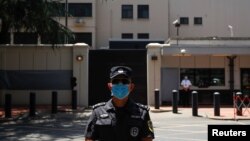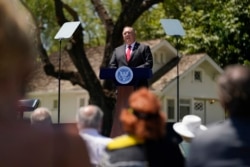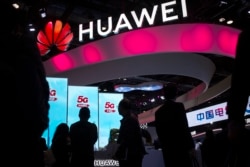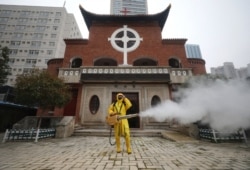With the increased tensions between the United States and China, observers are questioning if the relationship has reached a turning point.
Last week, China ordered U.S. diplomats to leave the consulate in the city of Chengdu. The move followed the U.S. order to close the Chinese consulate in Houston, Texas.
In addition, U.S. Secretary of State Mike Pompeo criticized China’s Communist Party leaders as untrustworthy during a speech at the Richard Nixon Presidential Library in California.
He said, “The kind of engagement we have been pursuing has not brought the kind of change in China that President Nixon hoped to induce.”
Nixon’s visit in 1972 opened the way for normalization of relations between the U.S. and mainland China. Before that time, the U.S. recognized Chiang Kai-shek’s government in Taiwan as the true government of China.
Trade dispute
Since 2018, China and the United States have been involved in a major trade dispute. It has resulted in both governments increasing taxes on imports from the other side. The U.S. is China’s single biggest export market – even with import taxes in place. China is the third largest market for American exporters.
The countries continue negotiations, but experts say, if they fail, the disagreement could place pressure on the world economy at a time when it is weak because of the coronavirus crisis.
Technology interdependence
U.S. and Chinese producers of telecommunications, computer, medical and other technology are closely linked. U.S. companies like Apple, Dell, Hewlett-Packard and many others depend on Chinese factories to build smartphones, computers and other electronics. Those Chinese factories need processors and other parts from the United States, Japan, Taiwan and Europe.
U.S. government moves to cut off some supplies to the Chinese company Huawei have disrupted the flow of parts among many technology companies.
Security issues
China claims almost all of the South China Sea as its territory. It has also developed manmade islands built up with military equipment in the area. As a result, China has territorial disputes with Brunei, Malaysia, the Philippines, Taiwan and Vietnam over the waterway.
Last week, the U.S. rejected China’s claims to most of the South China Sea. In a statement, Secretary of State Mike Pompeo said the claims “are completely unlawful.” Pompeo added the U.S. would consider protecting other countries in the area against China through legal means. And a State Department official suggested that economic measures could be placed on Chinese officials over the issue.
Human rights
The administration of U.S. President Donald Trump has denounced China for its treatment of ethnic minorities in Xinjiang and Tibet. As a result, the U.S. Commerce Department placed restrictions on 11 Chinese companies over human rights abuses.
As China established a new security law over Hong Kong, the U.S. said it would no longer treat Hong Kong as an autonomous territory from the mainland government. It said Hong Kong could face visa limits and economic measures similar to China.
Blaming China for the coronavirus
President Trump has also blamed China for failing to control the spread of the new coronavirus. By July 27, Johns Hopkins University’s Coronavirus Resource Center estimated that more than 16 million people have been infected with about 650,000 deaths around the world.
Many countries, including the U.S. and China, are researching to find an effective vaccine against the virus. Last week, the U.S. Justice Department charged two Chinese citizens with stealing intellectual property and targeting American companies working on coronavirus vaccine, testing devices and antiviral drugs.
Policy or politics?
Some experts suggest that the administration of President Donald Trump is raising tensions with China because he is seeking reelection in November. However, the competitive differences between the countries remain.
Chu Yin is a professor at the University of International Relations in Beijing. He said Americans who supported closer ties with China have been disappointed. He said China’s economic growth and development of a middle class has helped the ruling Communist Party rather than democratic change.
Steve Tsang is director of the China Institute at London’s School of Oriental and African Studies. He said, “We are looking at a structural change in the relationship, which will continue even if Trump does not get a second term.”
I’m Mario Ritter, Jr.
Mario Ritter Jr. adapted this story for VOA Learning English with additional reporting from the Associated Press. Hai Do was the editor.
________________________________________________________________
Words in This Story
engagement –n. the process of being involved with something
disrupt –v. to cause something to be unable to continue in the usual way
pursue –v. trying to carry out, seeking to realize
induce –v. to cause to happen, to bring about
autonomous –adj. able to govern oneself, able to operate independently









